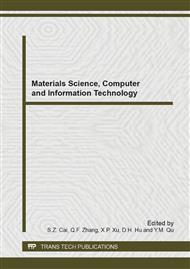[1]
Yifeng Dong. Research on Disaster Education in the Geography Teaching in MiddleSchools, Northeast Normal University of China, (2008).
Google Scholar
[2]
anru Wei, Mingyin Zhu. empirical research on disaster education of primary schools, Journal of Southwest University(Social Sciences Edition), (2012).
Google Scholar
[3]
Trey Menefee, Bjorn Harald Nordtveit. Disaster, civil society and education in China: A case study of an independent non-government organization working in the aftermath of the Wenchuan earthquake, International Journal of Educational Development, Vol. 32, pp.600-607, July (2012).
DOI: 10.1016/j.ijedudev.2011.10.002
Google Scholar
[4]
Ying Zhang, Min Wang. Preliminary Thought on Research of Disaster Education Theory andPractice, Journal of Catastrophology, (2011).
Google Scholar
[5]
Karen S. Hammad, Paul Arbon, Kristine M. Gebbie. Emergency nurses and disaster response: An exploration of South Australian emergency nurses' knowledge and perceptions of their roles in disaster response, Australasian Emergency Nursing Journal, Vol. 14, pp.87-94,. May (2011).
DOI: 10.1016/j.aenj.2010.10.002
Google Scholar
[6]
Patrick Besson, Frantz Rowe. Strategizing information systems-enabled organizational transformation: A transdisciplinary review and new directions. The Journal of Strategic Information Systems, vol. 21, no. 2, pp.103-124, (2012).
DOI: 10.1016/j.jsis.2012.05.001
Google Scholar
[7]
M.K. Chen, Shih-Ching Wang. The critical factors of success for information service industry in developing international market: Using analytic hierarchy process (AHP) approach. Expert Systems with Applications, vol. 37, no. 1, pp.694-704, (2010).
DOI: 10.1016/j.eswa.2009.06.012
Google Scholar


